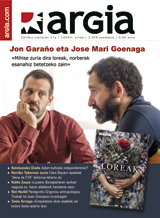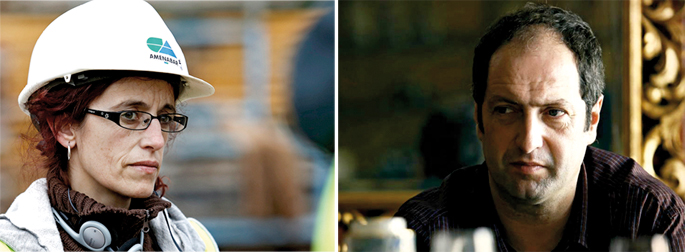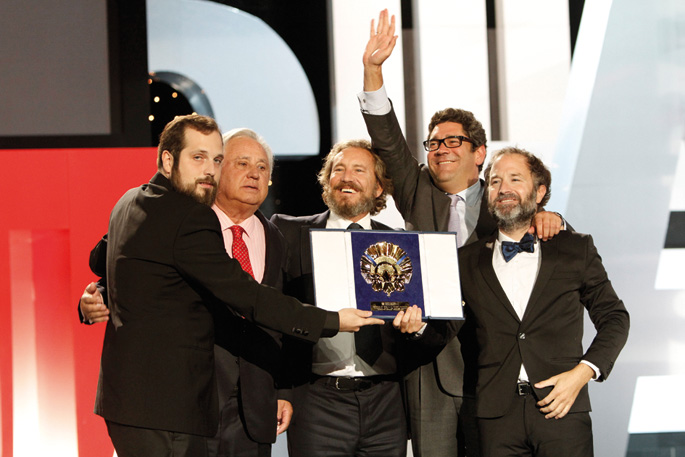"Metaphorical yes, but we don't want to be cryptic."
- Ane receives an anonymous bouquet, which suddenly disrupts her grey life. This is the start of the second film directed by Loreak, Jon Garaño and Jose Mari Goenaga (80 egunean, in 2010). He will compete for the Golden Shell at the San Sebastian Film Festival and has already been selected for festivals such as Toronto, London or Zürich, among others. It will arrive in the commercial rooms in October.

Ane, Tere and Lurdes, three women bear the weight of the film. It's not the most common.
Jose Mari Goenaga: History itself has asked us to do so, it has not been a conscious thing. The characters we had built according to the story we saw in women.
Deep characters with an evolution. How do you blame the characters?
JM. Goenaga: In this case, they have largely been shaped through the plot. The plot is measured, we wanted to deal with some issues, and depending on them we have been drawing the characters.
Jon Garaño: After the film was structured, the profiles of Ane and Tere were easy to reach. What happens to him very much affects Ane's personality, and we also had clear Tere's characteristics. We had more doubts with the character of Lurdes, and in this case we adapted the character to what Itziar Ituño [actresses] gave us.
JM. Goenaga: Because the actress herself gives you information, and when the script says there's a bad relationship between the two characters, we want you to also physically notice it. Not all the data has been verbalized, but they can be seen by whoever they want.
J. Garaño: After all, we make elaborate tokens of each character, but then a lot of details fall in. We've taken 50 minutes from the first version, because we also have to keep pace, because the movie has to be attractive -- and sacrifices are necessary.
The assembly has had a great deal to say then.
JM. Goenaga: The most important thing is that the essence of the script is in the movie, and although it seems paradoxical, removing scenes or altering their order, it can recover the essence. In the montage, we've rewritten the script in some way.
J. Garaño: The special structure of history [is not a chronological story] has allowed us to play and we have taken advantage of it. We have tried it in a narrative way in the assembly! And so, by changing the order and the sequences, we've managed to get back to the initial idea. It's been hard, but nice, because it's asked us for great creative work.
JM. Goenaga: The key has been how to place the sliced puzzle pieces from the shoot. Finally, we've created a game of mirrors in the movie: in the two main narrative structures, we've played with the same elements, but ordered differently.
Flowers can be powerful weapons…
JM. Goenaga: When a new element enters our daily life, the reaction it generates depends on the look: the threat in some, the illusion in others... The same element has no meaning, but each character, by the context they live or whatever, puts their own feelings and fears on that element. In the film, flowers are the white canvas, waiting for each to fill with meaning.
Flowers are also a way of remembering someone. And that is that the clash between memory and forgetfulness is the central theme of the film.
J. Garaño: Yes, through the flowers you keep the person alive inside you, and that habit is very widespread in our land, but people prefer to forget it, and sometimes we have more difficulty understanding that attitude. We argue that in the face of the same situation there may be many ways of acting and in the film these behaviors will collide. We've also included a third vision, people who want to remember or rewrite a memory that they haven't lived. Despite insisting on one of these attitudes, we wanted to point out that one can start in one way and finish in another: whoever wants to forget it can remember it and who wants to remember it forgets it. Our head, even if it presses us, will make its way.
Style and aesthetics are careful. Do the details make a movie special?
JM. Goenaga: The truth is that one of our challenges in this film has been to make a leap from the aesthetic, realization and atmosphere point of view, that the planes of each sequence have meaning, that the assembly is clean, that simple frames are achieved… We have also played with symmetry to achieve a concrete feeling and effect.
J. Garaño: Symmetry generates abnormal normality, these are normal situations, but they look special, and we wanted to play with it. With the voice off, sometimes the characters are out of the sequences and the viewer has to represent some reactions, be off, not be, because it makes sense. We have also paid attention to the spaces in which the characters move… We have taken care of many things, especially because they are important to us to maintain internal coherence, gives us security and you can see that there is an intention in the outcome, although we may not always understand it.
You've also played with the symbolism.
J. Garaño: Yes, then it's another question of how important people are, but it helps us to solidify our discourse and what we're counting on.
JM. Goenaga: Anyway, metaphorical yes, but we don't want to be cryptic. Someone won't understand a metaphor, but the plot can stay the same.
J. Garaño: In the end it's a game. A kind of spectator likes to "catch" these things, but they're not the basis of our films.
Are you looking for beauty in your cinema through all those aesthetic and games?
JM. Goenaga: Yes, the characters have a naturalist point, but at the same time we've looked for an aesthetic in the way we count, and I think the viewer will notice it. Florist, for example, where the stories of the film are born, we wanted it to be a nice, bright space, and in some moments we've also sought the preciosism in the images, the artifact. Same thing in music.
J. Garaño: Or, for example, the fact of gradually adorning and clarifying the dark and ugly place of work of the protagonist has served us to capture the internal evolution of the protagonist.
Do you need sensitivity to be a film director?
J. Garaño: In the movies you see the character of the director, they're kind of a stretch of our own, and in this movie too, in the details, our personality is obvious. In this sense, it seems normal to me that the sensitivity we can have as a person is reflected in the film, because what one or another director does about the same script is very different.
The film combines different shades: drama, intimistic environment, suspensive retouching… Is the gender mix more enriching?
J. Garaño: The flowers we see in the car on the road are the origin of the idea for the movie and, seeing those flowers, inevitably comes to mind the drama, but it also has some mystery, who and why does it put those flowers? What happened? We also wanted to bring that to the film: drama, suspense, mystery… That’s why we also found this story interesting.
JM. Goenaga: In the script and in the material that we recorded, there was also comedy, and in the result there was something left, but hardly. The story, after all, pulls away what it doesn't feel, and that's happened to us a lot in the montage: it starts to take off sequences and we're more serious than we thought, because it didn't accept those sequences anymore, because from one point the story comes to life of its own.
J. Garaño: I think more and more that the film speaks to you and that you have to listen to it. Sometimes you're not able to understand what it says and things don't work, but it's better to take care of, and that's why we've been forced to take off pretty sequences, because they didn't have room.
You have kept the style of the previous film, the work team… but what have you learned then, what have you improved this time?
J. Garaño: From the beginning I told Jose Mari that we had to take care of two very important things: on the one hand, the way we worked: that we had to talk less about each other especially in the shooting and at least we have improved a bit, ha, ha. And, on the other hand, when it comes to telling history, it had to be formally a step forward compared to the previous one and take greater risks. We have largely complied with both intentions, although we both have much to improve. I don't regret the classic style of 80 egunean, it was also the first film, but I think some things could be done differently. In the same way, in some things we have lost. An audience who likes 80 days is not going to like this because they're different, and people have defended a lot in 80 days, they've made the movie their own, and that's not easy, we don't know if Loreak will get that...
What is your desire with this second film?
J. Garaño: In 80 days, moreover, he has traveled a lot internationally, but in Euskal Herria he is not so well known, many people don't know him, and with Loreak we would like to change him, let him see here.
JM. Goenaga: It's a movie that can play when you leave the movie theater, a movie that can be made thinking and that I'd like the viewer to do that exercise.
J. Garaño: Yes, we get the impression that people like more movies the next day! But for that you have to think about the movie the next day…
Competing in the Official Section of Zinemaldia and recognising the quality of Basque cinema will it give an economic boost to Basque cinema?
J. Garaño: I want to think it can and should help. In addition to our own, at the San Sebastian Film Festival, other films made in Euskal Herria will be shown, and that is a sign of something. The Festival does not give them because they are from here, because they are not willing to lose their international prestige, and I would say that they require us more because we are from here, because their image is at stake. In this respect, it is a guarantee for the Basque industry.
Flowers - Trailer VOSE from Irusoin on Vimeo.
Jose Mari Goenagaren hitzetan, “pelikulari lotutako titularra da Sail Ofizialean euskarazko film bat ari dela lehian, eta alde horretatik, momentu honetan, bada nolabait euskararen ordezkari zineman. Ardura sentitzen dut, baina euskaraz ekoitzitako beste gauza asko dago, jakina. Antzera gertatu zaigu 80 eguneanekin: nazioarteko jaialdietan eman dutenean, beti galdetu digute hizkuntzaz, eta euskararen eta Euskal Herriaren berri ematea egokitu zaigu atzerrian. Instituzioetatik halako lanak bultzatzea ere horrela ulertzen dut nik, kultura baten leiho direlako”.
Bukatu da Donostiako Zinemaldiko 62. edizioa eta palmaresak utzi duen zaporeak badu zerikusirik espektatibekin. Ez da gauza bera Sail Ofizialean eskubide osoz sartu zarela pentsatuta joatea edo egotea bera garaipentzat hartzea.
Euskal Herriko ekoizpen onenaren saria irabazteko faboritoa Loreak bazen ere, Borja Cobeagaren Negociador lanak lortu du garaikurra. Eta zur eta lur geratu gara, xinplea iruditu baitzaigu Negociador, Josu Egiguren PSEko lehendakariak ETAko kideekin izandako elkarrizketetan... [+]
Bazkalosteko siesta dramatizatzeko jartzen duten telefilm horietako baten tankera hartu diot Vie sauvage ekoizpen frantziarrari. Semeak bahitu eta hamar urtez inguru urbanoetatik kanpo heziko dituen aitaren istorio ahul xamarrarekin bukatu da Sail Ofizialean lehian ziren... [+]
Intuchables arrakastatsuaren zuzendariek itxi dute Sail Ofiziala, immigrazioa bezalako gai konplikatuarekin tragikomedia bat eginez.
Banatu dira Donostiako Nazioarteko Zinemaldiaren 62. edizioko sariak. Magical girl film espainiarrak irabazi du Urrezko Maskorra eta La isla mínima, espainiarra hau ere, izan da sari gehien jaso dituen beste lana.
Krisi ekonomikoaren aitzakian egindako eskubide sozialen murrizketak eta horiek gizartean sortzen duten ezinegona dira Isaki Lacuestaren Murieron por encima de sus posibilidades filmak komedia zoro bat egiteko probesten dituen lehengaiak.
Danis Tanovic-ek film bakarra baino, bi ekarri ditu Sail Ofizialera: Tigers salaketa pelikula bat da eta salaketa pelikula bat egiteko zailtasun legalei buruzko filma ere bai.
Pablo Escobar narkotrafikatzaile ospetsua, eta Benicio del Torok berau nola irudikatu duen ikustea dira Escobar: Paradise lost pelikularen amu zinematografiko eta komertzial nagusiak. Baina ze pena, bigarren mailako pertsonaia da Escobar, pelikulako gaizkilea, eta hain figura... [+]
Lasa eta Zabala hasten den moduak konbentzitu nau gutxien, baina filmak aurrera egin ahala errealismoan eta gordintasunean irabazten du.
Umore beltza, oso beltza, dario Relatos salvajes filmari. Gizakion oinarrizko instintuak muturrera eramaten ditu zuzendariak, jolas gisa. Jolasa baita Relatos salvajes, istorioaz gaindi baita jolas narratibo eta estetikoa ere. Jolas sarkastikoa, biolentoa, esajeratua. Oso... [+]
Aurreiritziekin sartu naiz Magical girl ikustera, film luze bat lehen aldiz zuzendu duen Carlos Vermut Sail Ofizialean egotea festibal honek nazionalismo zinematografiko espainiarrari egiten dizkion kontzesio horietako bat izango zelakoan. Baina nahiko gustura ikusten den... [+]
























